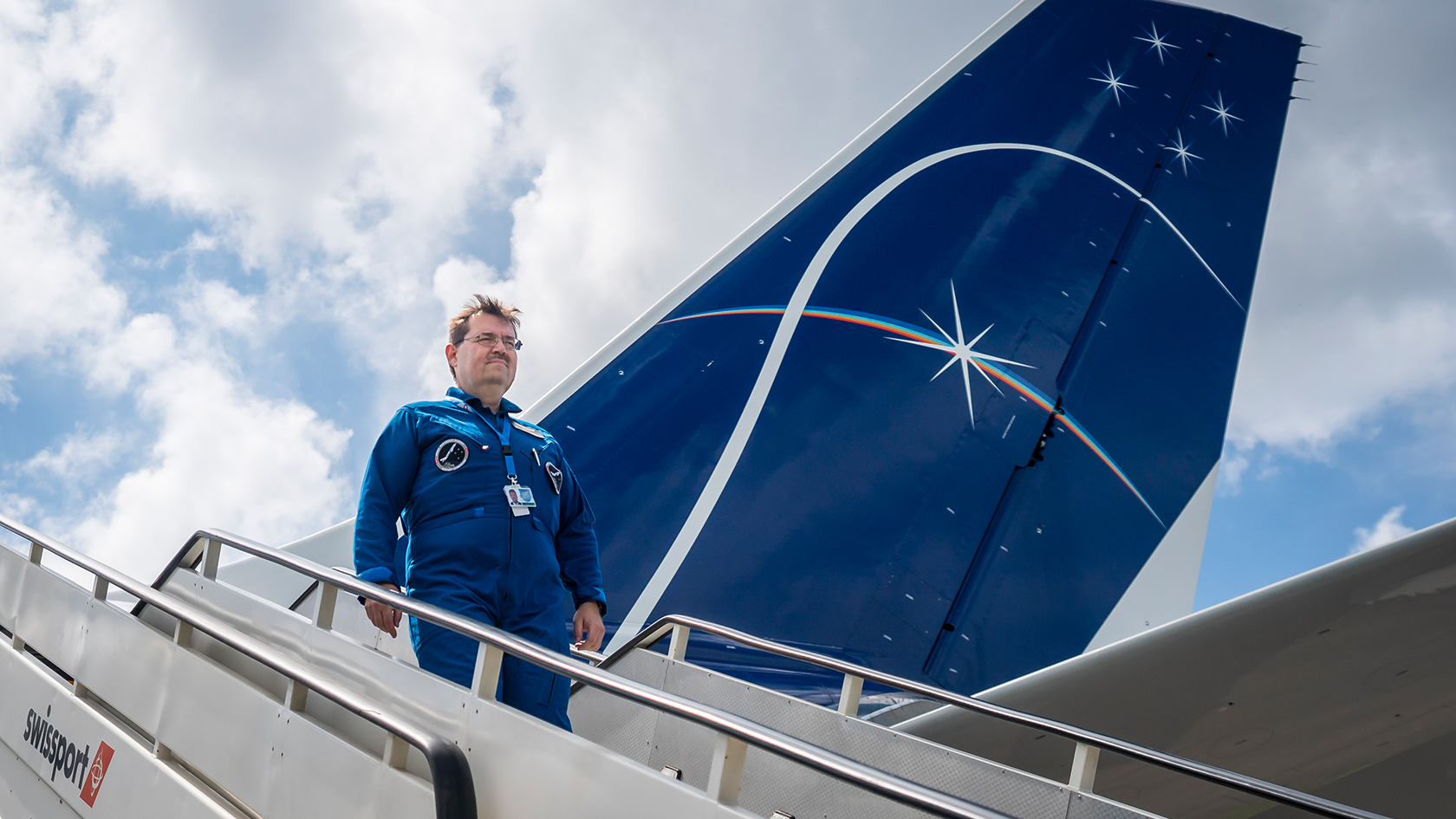Highest Honor for UZH Researcher

On the occasion of the 74th International Astronautical Congress, the International Academy of Astronautics (IAA) honored UZH Professor Oliver Ullrich with the Academy Award for the Life Sciences on 1 October. The UN-recognized IAA was founded in Stockholm in 1960 in the tradition of the great classical scientific academies and consists of individuals from currently 83 countries who have distinguished themselves in a branch of science fundamental to the exploration of space.
Oliver Ullrich was elected as life-time member of the Academy in 2012. The IAA's Life Science Award is considered the world's highest honor bestowed in the field of space life sciences. Ullrich is the second Swiss researcher to be honored with an IAA award. The award for Basic Sciences had been given in 1992 to Johannes Geiss, the physicist from Bern who conducted the very first experiment on the moon during the Apollo 11 mission.
A true pioneer
"We have had the great pleasure of working with Oliver Ullrich and his team over the past five years. This collaboration has been extremely productive scientifically – Oliver is truly a pioneer in his field," says Howard G. Levine, the chief scientist for NASA's ISS Research Office at Kennedy Space Center and former president of the American Society for Space and Gravitational Research, about UZH researcher Oliver Ullrich. The latter has been a full professor at the Institute of Anatomy at UZH since 2007 and is the Director of the 2018-founded UZH Space Hub. He is one of the pioneers who contributed significantly to establish and develop the research field of Space Life Sciences. With his research questions on how human cells react and adapt to changing gravitational conditions, he touches on fundamental principles of life and contributes to assessing and mitigating the risks of human spaceflight. The main feeling the award triggers in Ullrich is humility: "I feel the deepest gratitude towards the University of Zurich for creating the necessary freedom for its researchers to successfully tackle new and uncommon fields of research."
Inspired by Augusto Cogoli
For Ullrich, the impetus for researching the significance of gravity at the cellular level originated in the work of Swiss researcher Augusto Cogoli, who in 1984 was able to show that isolated cells respond to different gravitational environments. Twenty years ago, Ullrich began establishing a research concept that he continued to expand after his appointment at the University of Zurich. However, despite technically flawless experiments on many parabolic flights, research rockets and the International Space Station (ISS), it was not possible to establish a conclusive and robustly proven concept for gravity effects in human cells. What Ullrich did not know at the time was that he was looking in the wrong time frame and under the wrong assumption: at that time, it was assumed that altered gravity effects required a longer time to unfold in the cell and act through defined signaling pathways and receptors. His early experiments did not produce a breakthrough, but they did provide the experience needed to master the highly complex requirements of biomedical flight experiments more precisely and efficiently.
Breakthrough in 2015
The breakthrough came in an experiment in 2015, one of the very few experiments with real-time analytics aboard the ISS that enables gravitational effects to be tracked immediately. UZH researchers Oliver Ullrich and Cora Thiel were the first to determine that changes in gravity are transduced into a biological response by living cells within seconds, and that they furthermore can adapt to the new gravitational environment within seconds. This finding fundamentally changed the interpretation of all previous data. Based on their discovery, Ullrich and Thiel were awarded the Albrecht Ludwig Berblinger Prize of the German Academy of Aerospace Medicine, the most highly endowed prize in the field of aerospace medicine for German-speaking countries.
Whole cell reacts to gravity
Now that the "right" time frames were known, Ullrich developed a new approach based on the rapidly developing omics-technology. He understood the whole cell – rather than individual molecules – as the sensor and the individual molecules as executive and downstream structures of a system highly adaptable to changes in gravity. By combining the results of experiments from parabolic flights, research rockets and the ISS, Ullrich and his team succeeded in demonstrating in completely independent experiments that gravitational changes are mechanically sensed by the whole cell and transmitted to the nucleus. Such alterations lead to a change in the spatial position of gene groups, which in turn control the biological response. Thus, the response to gravity changes appears to be encoded in the spatial gene structure.
Space Act Agreement renewed
Ullrich's research projects are funded by the European Space Agency (ESA), among others. In addition, he conducts his research program in collaboration with NASA, based on an UZH-NASA-Space Act Agreement. This agreement was renewed on 1 October – the day of the award ceremony – for another five years. In 2015, Ullrich launched the Swiss Parabolic Flight Campaigns, which offer access to experiments in altered gravity at the Dübendorf Military Airfield for national and international researchers. Ullrich is also co-founder and president of the Swiss Skylab Foundation and has founded numerous startups.
For the benefit of humanity
Currently, Ullrich and his team are focusing on applications from insights gained over decades of fundamental research: Oliver Ullrich, together with Cora Thiel, developed a method to produce three-dimensional transplantable organ tissues from adult stem cells in microgravity. Insights from hyper-gravity are also relevant: centrifuging cells – a laboratory routine – is done under enormous G-forces. Little thought is given today to potential effects of this routine laboratory procedure. For Ullrich, the gravitational environment not only represents a fundamental principle for life on Earth, he also understands gravity as a tool to fundamentally improve biological and medical processes. Thus, his work represents fully the goals of the International Academy of Astronautics: "Shaping excellence in research and innovation for the benefit of humanity."